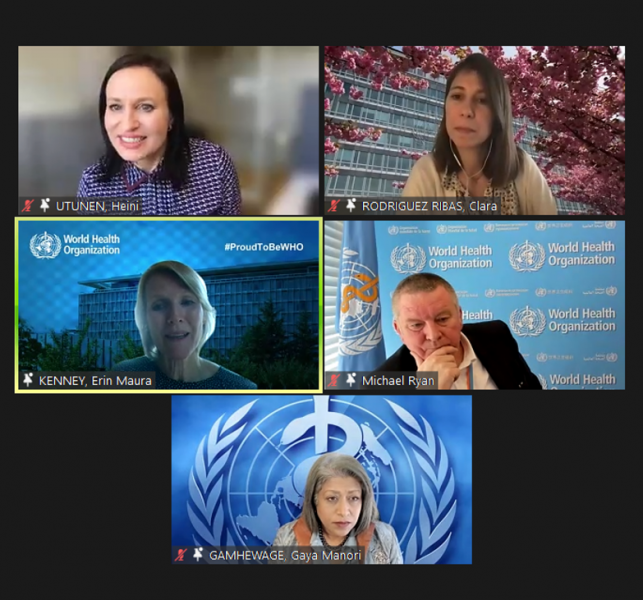
Celebrating Women in Leadership: A conversation about challenges, enablers and opportunities for women working in health emergencies.
WHO, WHO Health Emergencies Programme
April 20, 2022
Global
On March 8th, the WHO Health emergencies programme joined the world in celebrating International Women’s Day, hosting an internal discussion on Celebrating Women in Leadership: A conversation about challenges, enablers and opportunities for women working in health emergencies. The event, co-organized by the WHE Gender Working Group and the WHO Learning and Career Development Unit, was an opportunity to take stock of the journey women leaders in WHO have gone through to reach their current roles, and to discuss the evidence that supports the importance of positioning women in decision making roles.
The event included participation of the WHE Executive Director, Dr Mike Ryan, who stated unequivocally that “We will not have a sustainable tomorrow unless we have gender equality. It is not possible to deliver, and we will not be an effective programme unless we have equity.” He spoke about the progress made in past decades to increase women representation in middle management roles within the emergencies programme- as reflected in the near-gender parity reached in professional level positions. However, there was a recognition that more needs to be done: women are still under-represented in the P6 and above categories of staff. There are still barriers that need to be broken down.
Erin Kenney, acting lead of the Gender, Equity and Rights unit of WHO, shared a moving personal reflection on her upbringing, the challenges that she faced as a woman when managing all-male teams, and the tools she has used throughout her career to address them. Dr. Gaya Gamhewage, acting director for the Prevention and Response to Sexual Exploitation, Abuse and Harassment, brought to the forefront statistics about women´s leadership within the UN System and identified multiple areas of action that are urgently needed to increase women´s engagement in humanitarian action. These include working on confidence and skills, personal safety and security; well-being and support; perceptions, stereotypes and sexual behaviors; and family, childcare and personal relationships.
The final speaker, Clara Rodriguez Ribas, introduced the work of the WHE Gender Working Group and the WHE Gender Mainstreaming Strategy (2022-2026) which is under publication. The strategy seeks to operationalize several WHA resolutions and recommendations from high-level panels, as well as the GPW 13. It has 3 core outcomes:
- WHE is gender responsive across programs and all operations
- WHE is gender-balanced across staffing and organizational levels
- WHE is accountable with systems effectively supporting a gender responsive program.
The seminar offered a platform to re-confirm WHEs commitment to gender equality, and to bring to the foreground issues which are essential for the effective delivery of WHOs health emergencies programme. The conversation about women´s leadership in emergencies will continue under the auspices of the WHE Gender Working Group, chaired by Dr.Stella Chungong, and through the implementation of the WHE Gender Mainstreaming Strategy.
“If we want to serve the diverse populations affected by crisis, and to do it well and safely – we need women leading in the front lines of our operations.”
Dr Mike Ryan, WHE Executive Director.